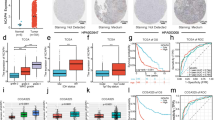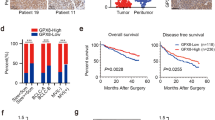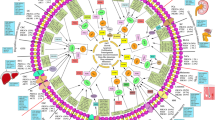Abstract
Tumor metastasis and chemoresistance are the main causes of treatment failure and high mortality in hepatocellular carcinoma (HCC). Therefore, it is critical to clarify the biological action and potential mechanisms in HCC cells to develop novel therapeutics. The regulator of chromosome condensation 2 (RCC2), a component of the chromosomal passenger complex, was shown to have important roles in tumor development and radio-chemotherapy resistance. However, its role in the aggressive phenotypes and cisplatin (DDP)-resistance of HCC is not known. Therefore, this study aimed to investigate the role of RCC2 in HCC pathogenesis. Interestingly, we found that RCC2 was upregulated in HCC patient specimens and HCC cell lines and was correlated with the pathological grade of HCC. To evaluate the function of RCC2 in HCC cell, lentivirus vector-based shRNAs were transfected into HCC cells. Silencing RCC2 inhibited the HCC cell proliferation, migration, invasion, and increased the apoptosis rate upon DDP treatment. Further analysis showed that RCC2-mediated downregulation of the expression of survival proteins occurred via the AKT and Bcl2 pathways. Our results suggest that RCC2 might act as an oncogenic protein promoting metastatic behaviors and cisplatin resistance in HCC cells, and thereby could be a potential prognostic biomarker and therapeutic target for HCC.






Similar content being viewed by others
Change history
10 February 2021
A Correction to this paper has been published: https://doi.org/10.1007/s13577-020-00480-1
References
Mizejewski GJ. Does alpha-fetoprotein contribute to the mortality and morbidity of human hepatocellular carcinoma? A commentary. J Hepatocell Carcinoma. 2016;3:37–40.
Thompson H. Cancer of the liver, esophagus, and nasopharynx. J Clin Pathol. 1988;41:359–459.
Chi HC, Chen SL, Cheng YH, et al. Chemotherapy resistance and metastasis-promoting effects of thyroid hormone in hepatocarcinoma cells are mediated by suppression of FoxO1 and Bim pathway. Cell Death Dis. 2016;7:e2324.
Dennert G, Horneber M. Selenium for alleviating the side effects of chemotherapy, radiotherapy and surgery in cancer patients (review). Cochrane Database Syst Rev. 2006;19:CD005037.
Amichetti M. Editorial hot topic: the association of radiotherapy and chemotherapy (guest editor: Maurizio Amichetti). Curr Drug Ther. 2010;5:151–251.
Sakamoto K, Nagano H. Surgical treatment for advanced hepatocellular carcinoma with portal vein tumor thrombus. Hepatol Res. 2017;47:957–62.
Yang JM, Wang RQ, Bu BG, Zhou ZC, Luo YH. Effect of HCV infection on expression of several cancer-associated gene products in HCC. World J Gastroenterol. 1999;5:25.
Stacey SN, Gudbjartsson DF, Sulem P, et al. Common variants on 1p36 and 1q42 are associated with cutaneous basal cell carcinoma but not with melanoma or pigmentation traits. Nat Genet. 2008;40:1313–8.
Renault L, Kuhlmann J, Henkel A, Wittinghofer A. Structural basis for guanine nucleotide exchange on ran by the regulator of chromosome condensation (RCC1). Cell. 2001;105:245–55.
Papini D, Langemeyer L, Abad MA, et al. TD-60 links RalA GTPase function to the CPC in mitosis. Nat Commun. 2015;6:7678.
Bruun J, Kolberg M, Ahlquist TC, et al. Regulator of chromosome condensation 2 identifies high-risk patients within both major phenotypes of colorectal cancer. Clin Cancer Res. 2015;21:3759–70.
Pang B, Wu N, Guan R, et al. Overexpression of RCC2 enhances cell motility and promotes tumor metastasis in lung adenocarcinoma by inducing epithelial-mesenchymal transition. Clin Cancer Res. 2017;23:5598–610.
Gong S, Chen Y, Meng F, et al. RCC2, a regulator of the RalA signaling pathway, is identified as a novel therapeutic target in cisplatin-resistant ovarian cancer. FASEB J. 2019;33:5350–65.
Buranjiang G, Kuerban R, Abuduwanke A, Li X, Kuerban G. MicroRNA-331-3p inhibits proliferation and metastasis of ovarian cancer by targeting RCC2. Arch Med Sci. 2019;15:1520–9.
Yu H, Zhang S, Ibrahim AN, Wang J, Deng Z, Wang M. RCC2 promotes proliferation and radio-resistance in glioblastoma via activating transcription of DNMT1. Biochem Biophys Res Commun. 2019;516:999–1006.
Zhou XD. Recurrence and metastasis of hepatocellular carcinoma: progress and prospects. Hepatobiliary Pancreat Dis Int. 2002;1:35–41.
Huang X, Zeng Y, Xing X, et al. Quantitative proteomics analysis of early recurrence/metastasis of huge hepatocellular carcinoma following radical resection. Proteome Sci. 2014;12:22.
Boucher E, Corbinais S, Brissot P, Boudjema K, Raoul J-L. Treatment of hepatocellular carcinoma (HCC) with systemic chemotherapy combining epirubicin, cisplatinum and infusional 5-fluorouracil (ECF regimen). Cancer Chemother Pharmacol. 2002;50:305–8.
Ul-Islam S, Ahmed MB, Shehzad A, Ul-Islam M, Lee YS. Failure of chemotherapy in hepatocellular carcinoma due to impaired and dysregulated primary liver drug metabolizing enzymes and drug transport proteins: what to do? Curr Drug Metab. 2018;19:819–29.
Moore JD. The Ran-GTPase and cell-cycle control. BioEssays. 2000;23:77–85.
Xiong DD, Feng ZB, Lai ZF, et al. High throughput circRNA sequencing analysis reveals novel insights into the mechanism of nitidine chloride against hepatocellular carcinoma. Cell Death Dis. 2019;10:658.
Madhunapantula SV, Mosca PJ, Robertson GP. The Akt signaling pathway. Cancer Biol Ther. 2011;12:1032–49.
Altomare DA, Testa JR. Perturbations of the AKT signaling pathway in human cancer. Oncogene. 2005;24:7455–64.
Slomovitz BM, Coleman RL. The PI3K/AKT/mTOR pathway as a therapeutic target in endometrial cancer. Clin Cancer Res. 2012;18:5856–64.
Dai J, Huang Q. Sestrin 2 confers primary resistance to sorafenib by simultaneously activating AKT and AMPK in hepatocellular carcinoma. Cancer Med. 2018;7:5691–703.
Shimura T. Acquired radioresistance of cancer and the AKT/GSK3β/cyclin D1 overexpression cycle. J Radiat Res. 2011;52:539.
Shimura T. Targeting the AKT/cyclin D1 pathway to overcome intrinsic and acquired radioresistance of tumors for effective radiotherapy. Int J Radiat Biol Relat Stud Phys Chem Med. 2017;93:381–5.
Wu SY, Lan SH, Wu SR, et al. Hepatocellular carcinoma-related cyclin D1 is selectively regulated by autophagy degradation system. Hepatology. 2018;68:141–54.
Funding
None applicable.
Author information
Authors and Affiliations
Corresponding authors
Ethics declarations
Conflict of interest
The authors declare that they have no conflict of interest.
Ethical approval
With the approval of the Ethic Committee of the First Hospital of Jilin University (2014204A), we collected HCC cancer tissues as well as matched adjacent normal tissues.
Informed consent
Written informed consents were acquired from each participating patient. The usage of cell lines and experimental animals (nude mice) was approved by the Scientific Ethics Committee of Jilin University (SXXK-JLU-2018-013).
Additional information
Publisher's Note
Springer Nature remains neutral with regard to jurisdictional claims in published maps and institutional affiliations.
Rights and permissions
About this article
Cite this article
Chen, Q., Jiang, P., Jia, B. et al. RCC2 contributes to tumor invasion and chemoresistance to cisplatin in hepatocellular carcinoma. Human Cell 33, 709–720 (2020). https://doi.org/10.1007/s13577-020-00353-7
Received:
Accepted:
Published:
Issue Date:
DOI: https://doi.org/10.1007/s13577-020-00353-7




